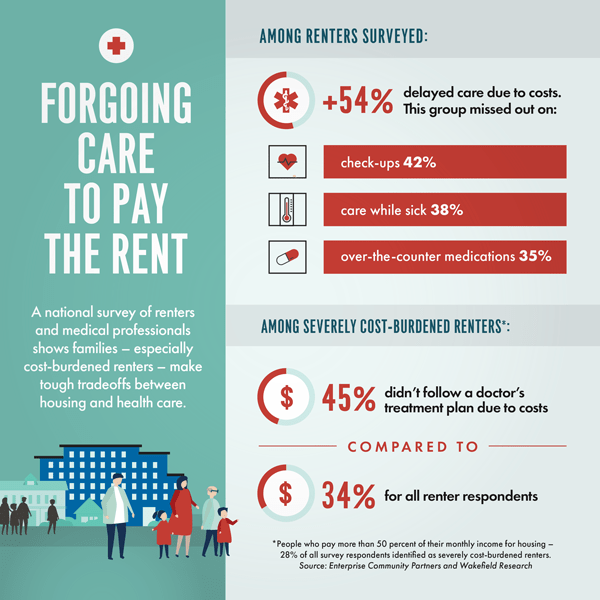Results evidence of “urgent quest for health equity”
A first-of-its-kind national survey of renters and medical professionals underscores the daily struggles of families compelled to put making rent over maintaining their health. The survey results show renters – especially people who pay a significant portion of their income toward rent – often delay regular medical visits and forego treatment plans.
The survey, released by Enterprise’s Health Begins with Home initiative, gives voice to renters and medical professionals nationwide, revealing new insights about the crucial intersection between health and home in the United States.
“No one should have to choose between paying rent and paying for health care,” said Laurel Blatchford, president, Enterprise Community Partners. “And yet, thousands of people make that difficult trade off every day. That’s wrong.”
Enterprise conducted the online survey in partnership with Wakefield Research. The survey polled 1,000 U.S. adult renters, 500 of whom have household incomes of $50,000 or under, and 500 U.S. medical professionals, including doctors, nurses and physician assistants.

More than half of the renters surveyed(54 percent)said they have delayed medical care specifically because they couldn’t afford it. They miss out on:
- Preventive routine check-ups
- Treatment while sick
- Over-the-counter medications
All 500 medical professionals surveyed said at least some of their patients had expressed concerns about affordable housing. And 92 percent of medical professionals who advise stress-reduction for patients said patients tell them financial pressure is their greatest source of stress.
As part of Health Begins with Home, Enterprise will put $250 million to work over five years to promote health as a top priority in the development and preservation of affordable homes and to elevate homes as an essential tool for improving resident and community health.
Through expanding partnerships with leading health care providers like Kaiser Permanente and UnitedHealthcare, Enterprise is accelerating collaboration between the health and housing sectors toward improving physical and emotional well-being.
“By working closely with health care organizations, we’re creating ways for renters to afford the health care they need,” said Enterprise’s Blatchford.
The survey found the need for affordable homes that are healthy and connected to opportunity especially critical for severely cost-burdened survey respondents, who spend more than 50 percent of their monthly income on rent. Among respondents in this category:
- 83 percent prioritize paying rent before anything else, compared with 1 percent prioritizing health care costs
- 45 percent have not followed a treatment plan provided by a health care professional because they couldn’t afford it, compared with 34 percent of all renter respondents
- 31 percent delayed a routine check-up because they couldn’t afford it, compared with 23 percent of all renter respondents
- 89 percent report financial stress is the issue in their lives worst for their mental health
Severely rent-burdened respondents also reported low satisfaction rates with their homes because of factors affecting health, such as: inadequate access to outdoor spaces, exposure to indoor toxins and poor air quality.
“Our health is inextricably linked to our home – whether it’s poorly designed or maintained housing, stress from having to move frequently, or illness that develops or goes untreated because of skipping care and treatment to make rent,”said Brian Rahmer, Enterprise’s vice president of Health and Housing.
Rahmer said the recent Enterprise survey adds to growing evidence on the interdependence between health and housing and the urgent quest for health equity, so that no one has to choose between staying healthy and staying in their home.
